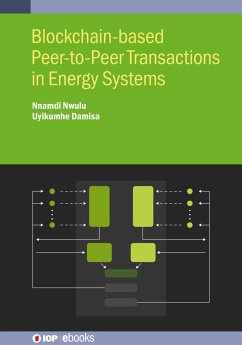Blockchain-based Peer-to-Peer Transactions in Energy Systems begins with an introduction to blockchain technology, which covers cryptographic hashing, Merkle trees, types of blockchain and common consensus mechanisms. It discusses selected real-world blockchains and their real-world applications. Recent advances in blockchain technology from different perspectives are also reported in the book.
With a focus on the Ethereum blockchain, the book introduces smart contract development tools and demonstrates practical development of simple smart contracts. Various components of a typical smart contract are highlighted and explained. The final section of the book zeros in on blockchain-based applications in the energy industry. It covers the development of smart contracts for specific use-cases in the industry, as well as smart contract testing using hypothetical datasets. Current limitations of blockchain technology and barriers to its adoption are highlighted alongside potential policy and regulatory frameworks for improved adoption.
Readers will gain basic knowledge to innovate blockchain-based solutions within and beyond the energy industry. They will also be equipped with basic smart contract development skills. The book takes the reader from understanding blockchain technology to developing simple and use-case-specific smart contracts. Although it focuses on the energy sector, the explored smart contract use-cases can be adapted to other industries. Researchers will find the results of the literature surveys handy, and regulatory bodies will gain insights from the discussion on policy and regulatory framework for improved blockchain adoption.
With a focus on the Ethereum blockchain, the book introduces smart contract development tools and demonstrates practical development of simple smart contracts. Various components of a typical smart contract are highlighted and explained. The final section of the book zeros in on blockchain-based applications in the energy industry. It covers the development of smart contracts for specific use-cases in the industry, as well as smart contract testing using hypothetical datasets. Current limitations of blockchain technology and barriers to its adoption are highlighted alongside potential policy and regulatory frameworks for improved adoption.
Readers will gain basic knowledge to innovate blockchain-based solutions within and beyond the energy industry. They will also be equipped with basic smart contract development skills. The book takes the reader from understanding blockchain technology to developing simple and use-case-specific smart contracts. Although it focuses on the energy sector, the explored smart contract use-cases can be adapted to other industries. Researchers will find the results of the literature surveys handy, and regulatory bodies will gain insights from the discussion on policy and regulatory framework for improved blockchain adoption.
Dieser Download kann aus rechtlichen Gründen nur mit Rechnungsadresse in A, D ausgeliefert werden.









